Hosts Meaning in the Bible: Heavenly Armies
In the Bible, the term ‘hosts’ primarily refers to celestial armies of angels under God’s command, often emphasizing His supreme authority and sovereign power. In the Old Covenant, it signifies God’s dominion over both heavenly beings and the cosmos (1 Samuel 1:3; Genesis 2:1).
In the New Covenant, ‘hosts’ continue to represent angels who herald divine events, such as the birth of Christ (Luke 2:13-14), and engage in spiritual warfare (Revelation 12:7-9). This term underscores God’s role as the Lord of Hosts, orchestrating divine order and protecting His people, which can offer deeper insights into His majestic sovereignty.

Hosts Meaning in the Bible: Understanding God’s Heavenly Armies
| Aspect | Details |
|---|---|
| Biblical Term | Hosts |
| Hebrew Root | Tsaba (צָבָא) – meaning army, warfare, service |
| Biblical Usage | Refers to heavenly armies, angelic beings, or vast multitudes |
| Key Verses | Genesis 2:1, 1 Samuel 1:3, Isaiah 6:3, Luke 2:13 |
| Common Phrase | “The Lord of Hosts” – a title for God emphasizing His power and authority |
| Spiritual Insight | Represents God’s sovereignty, protection, and command over all creation |
| Application | Reminds believers of God’s might and the unseen spiritual forces at work |
Old Testament References
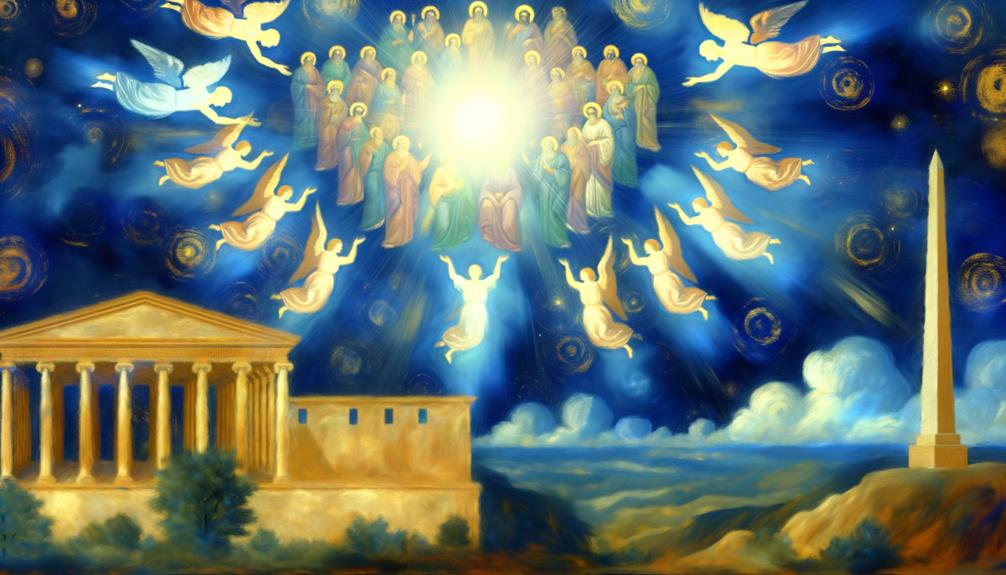
The term ‘hosts’ in the Old Scripture frequently refers to the celestial armies of angels under the command of Yahweh, illustrating His supreme authority and sovereign power. This depiction is particularly evident in passages such as 1 Samuel 1:3, where Yahweh is called ‘Lord of hosts,’ underscoring His leadership over these divine entities.
Historically, this terminology reinforced God’s omnipotence and His role as a divine warrior. Scriptural analysis reveals that the term ‘hosts’ also encompasses the stars and heavenly bodies, as seen in Genesis 2:1.
Therefore, the usage of ‘hosts’ in the Old Testament paints a thorough image of a sovereign God who commands both the celestial and cosmic domains, ensuring order and demonstrating His ultimate dominion.
New Testament Insights
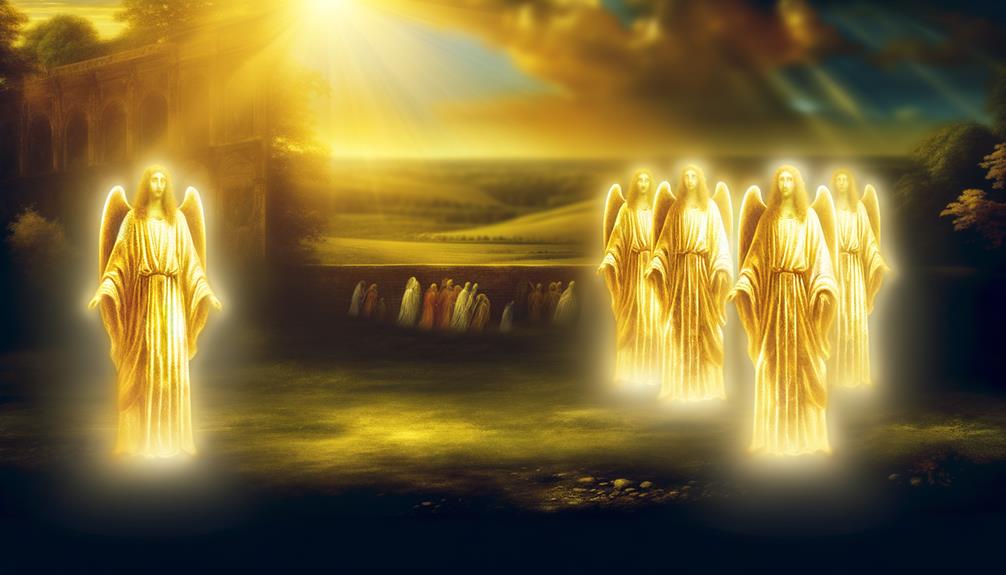
In the New Covenant, the term ‘hosts’ continues to signify the multitude of angelic beings, reflecting God’s enduring authority and active role in the spiritual domain.
The New Scripture provides several insights into this celestial host:
- Divine Announcements: Angels, as hosts, herald the birth of Jesus Christ (Luke 2:13-14).
- Spiritual Warfare: They engage in battles against demonic forces (Revelation 12:7-9).
- Ministry to Believers: These hosts serve and protect the faithful (Hebrews 1:14).
- Eschatological Significance: They accompany Christ during His second coming (Matthew 25:31).
These instances emphasize the continuity and expansion of angelic hosts’ roles, underscoring their significance within God’s redemptive plan.
Armies of Heaven
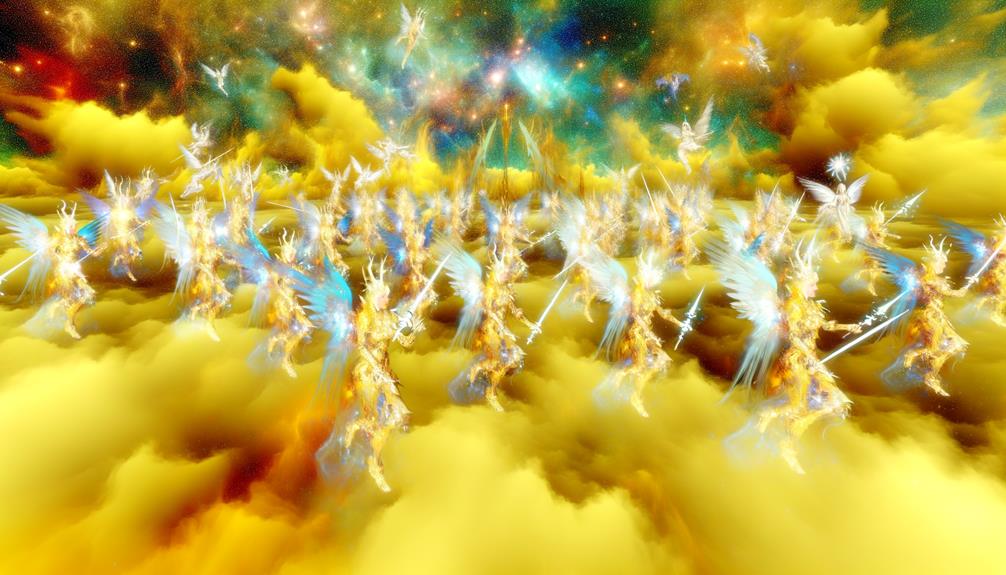
The concept of the ‘Armies of Heaven‘ in biblical texts refers to angelic military forces that serve divine purposes, often depicted as engaging in cosmic battles against the forces of evil.
Historical context and scriptural references, such as in Revelation 19:14, illustrate these celestial armies following Christ, indicating a structured hierarchy and divine order within these ranks.
This theological framework underscores the sovereignty of God in orchestrating both heavenly and earthly domains through His angelic hosts.
Angelic Military Forces
How do the scriptures portray the celestial hosts in their role as the formidable armies of heaven? The Bible vividly describes angelic military forces as divine warriors executing God’s will with unparalleled power and precision. These celestial hosts, often led by the archangel Michael, manifest in visions of battle and divine intervention.
- Psalm 103:20 – ‘Bless the Lord, ye his angels, that excel in strength, that do his commandments, hearkening unto the voice of his word.’
- Revelation 12:7 – ‘And there was war in heaven: Michael and his angels fought against the dragon.’
- 2 Kings 6:17 – ‘And behold, the mountain was full of horses and chariots of fire round about Elisha.’
- Joshua 5:14 – ‘As captain of the host of the Lord am I now come.’
These scriptures underscore the awe and reverence commanded by these divine armies.
Divine Battle Hierarchies
Why does the Bible emphasize the hierarchical structure of the heavenly armies, and how does this organization reflect the divine order and authority established by God? Scriptural references, such as Daniel 10:13 and Revelation 12:7, highlight angelic ranks like Michael the Archangel, underscoring divine order.
Hierarchies within the celestial hosts mirror the structured nature of God’s kingdom, emphasizing obedience and purpose. Historical context reveals that ancient Israel viewed heavenly armies as reflections of divine authority, reinforcing societal norms of leadership and service.
| Rank | Scriptural Reference |
|---|---|
| Archangel | 1 Thessalonians 4:16 |
| Seraphim | Isaiah 6:2-3 |
| Cherubim | Ezekiel 10:1-2 |
Understanding these hierarchies deepens our grasp of biblical cosmology and God’s sovereign rule.
Angelic Hosts
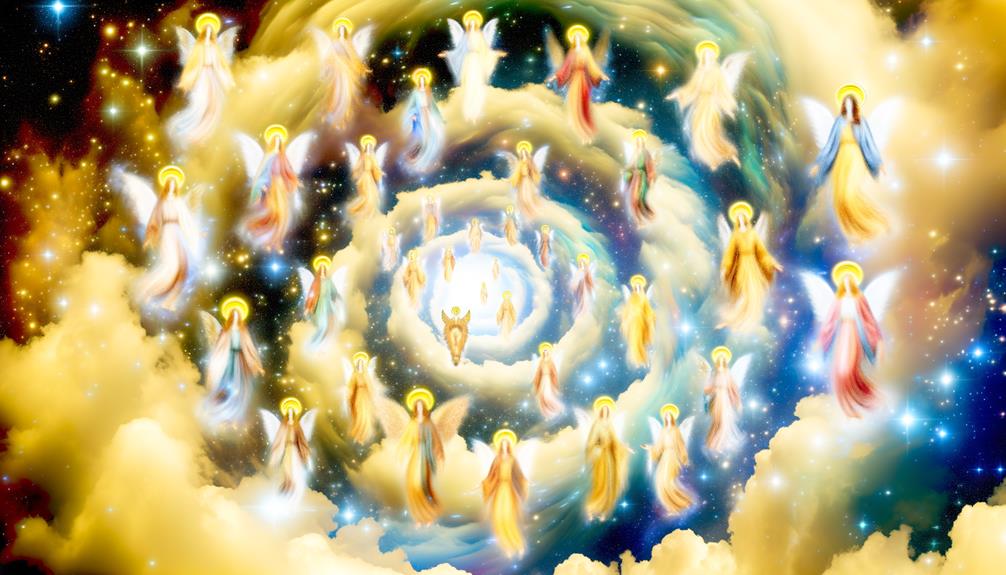
Understanding the role of angelic hosts in the Bible requires examining their divine assignments and interactions with humanity as depicted in scripture. These celestial beings serve pivotal roles in God’s plan, often acting as messengers, warriors, and protectors.
- Messengers of God: Angelic hosts frequently deliver God’s messages, as seen with Gabriel’s announcement to Mary (Luke 1:26-38).
- Heavenly Warriors: They engage in spiritual battles, protecting God’s people, illustrated in Daniel’s visions (Daniel 10:13).
- Divine Worshippers: They continually worship God, exemplified in Isaiah’s vision of seraphim (Isaiah 6:1-3).
- Guides and Protectors: They guide and protect the faithful, such as the angel who led Peter out of prison (Acts 12:7-10).
These roles highlight their integral place in biblical narratives.
Divine Assemblies
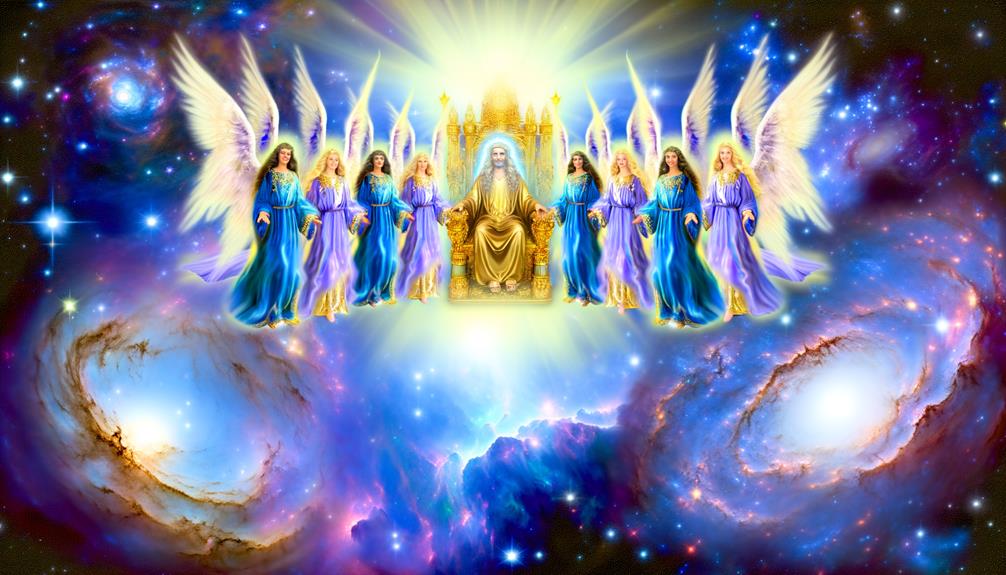
Divine assemblies in the Bible, often depicted as gatherings of heavenly beings, serve as celestial councils where God communicates His divine will and judgments. These assemblies underscore the collaborative nature of divine governance, as seen in passages like 1 Kings 22:19-23 and Job 1:6-12.
Historically, such assemblies reflect ancient Near Eastern concepts of a divine council, where gods deliberated on cosmic affairs. Scripturally, these scenes illustrate the sovereignty and omniscience of God, who presides over a host of spiritual entities.
| Scripture Reference | Description |
|---|---|
| 1 Kings 22:19-23 | Micaiah’s vision of the heavenly court |
| Job 1:6-12 | Satan’s appearance before God |
| Isaiah 6:1-8 | Isaiah’s vision of the seraphim |
| Daniel 7:9-10 | The Ancient of Days and the court |
| Revelation 4:1-11 | John’s vision of the heavenly throne |
Hosts in Prophecy
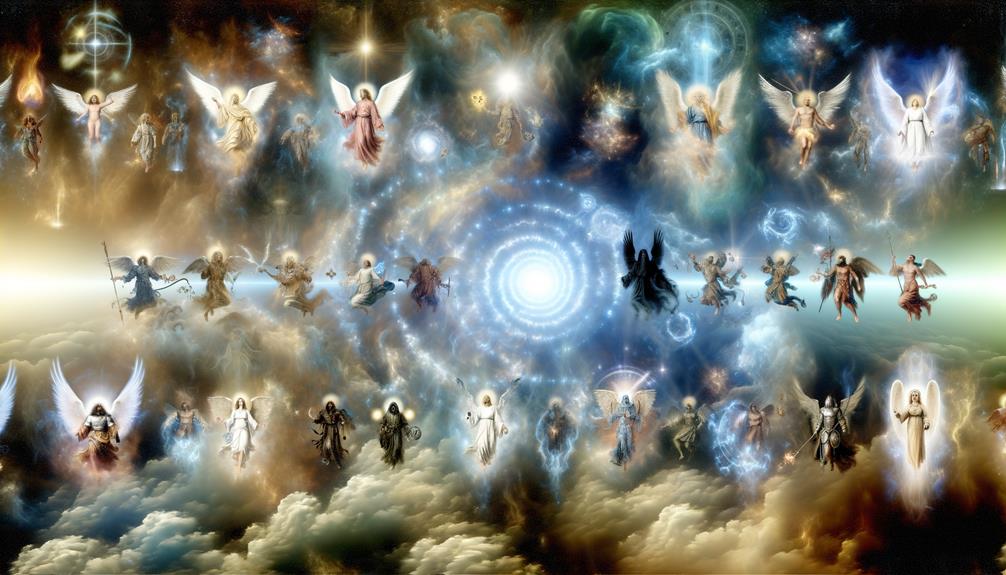
The prophetic literature of the Bible frequently employs the imagery of divine armies to convey themes of judgment and redemption.
Angelic hosts play vital roles in these prophecies, often depicted as executing God’s will and heralding significant eschatological events.
Through an analysis of passages such as Daniel 10 and Revelation 12, we gain insight into the symbolic function of these heavenly beings within the broader narrative of divine intervention and cosmic warfare.
Symbolism of Divine Armies
Frequently depicted in various prophetic texts, the concept of ‘hosts’ symbolizes the formidable and organized celestial armies under divine command, reflecting God’s supreme authority and power.
This symbolism is rich with theological and historical significance, often illustrating the divine intervention in human affairs. The ‘hosts’ serve as a reminder of God’s omnipotence and the ultimate triumph of good over evil.
Scriptural references to these armies can evoke profound emotional responses, emphasizing the magnitude of divine might.
- Isaiah 13:4: The Lord musters an army for battle, showcasing His sovereignty.
- Revelation 19:14: Heavenly armies follow Christ, signifying divine justice.
- Daniel 10:13: Angelic princes engage in spiritual warfare, indicating cosmic conflict.
- Joshua 5:14: The captain of the Lord’s host appears, symbolizing divine leadership.
Angelic Roles in Prophecy
In biblical prophecy, angelic hosts often appear as messengers and warriors, playing pivotal roles that underscore God’s intervention in human history and the unfolding of divine plans.
For instance, in Daniel 10, the angel Gabriel delivers a vision of future events, highlighting the celestial involvement in prophetic revelations.
Similarly, in Revelation 12, Michael and his angels engage in cosmic warfare against the dragon, symbolizing the ultimate triumph of divine forces over evil.
These narratives reveal that angelic hosts are not mere spectators but active participants in divine orchestration.
Symbolism and Imagery

Often imbued with rich symbolism, the term ‘hosts’ in the Bible frequently evokes imagery of divine armies and celestial beings, underscoring the majesty and omnipotence of God. This multifaceted concept is etched in the sacred texts, reflecting theological depth and historical context.
- Heavenly Armies: In numerous passages, such as 2 Kings 6:17, ‘hosts’ symbolize God’s formidable army, revealing divine protection and power.
- Angelic Beings: Isaiah 6:3 portrays ‘hosts’ as angelic entities singing praises, illustrating celestial worship.
- Cosmic Order: The phrase ‘Lord of hosts’ emphasizes God’s sovereignty over the cosmos, as seen in Jeremiah 31:35.
- Spiritual Warfare: Ephesians 6:12 alludes to spiritual battles, with ‘hosts’ representing the forces of good against evil.
This rich imagery invites readers to contemplate God’s grandeur and the divine orchestration of the universe.
Theological Implications
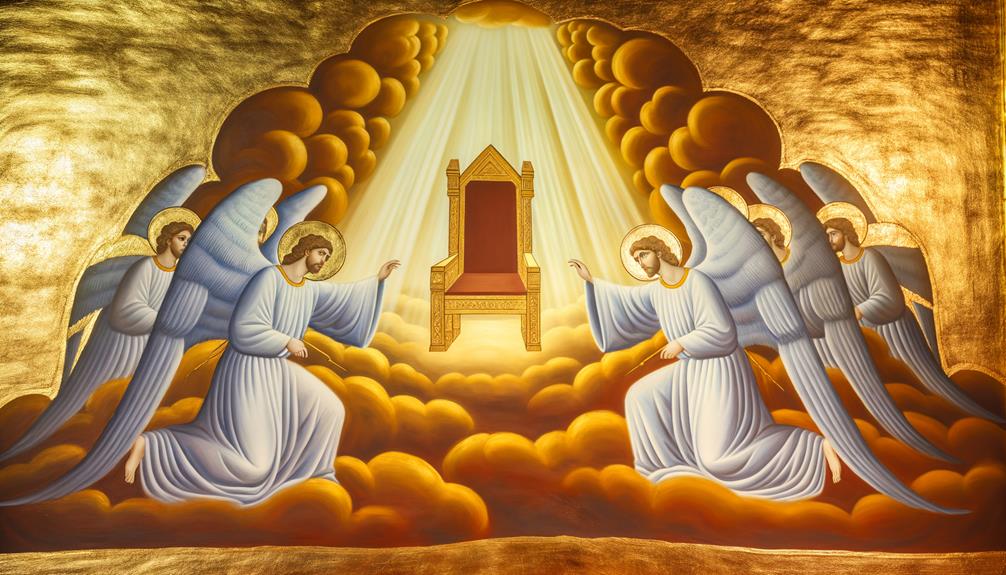
Building upon the profound symbolism and imagery of ‘hosts’ in the Bible, the theological implications of this term reveal deep insights into God’s nature, His authority, and the spiritual realities that govern the cosmos.
The term ‘hosts’ often refers to the armies of heaven, denoting God’s omnipotence and sovereign rule over all creation.
Scripturally, passages like 1 Samuel 1:3 and Psalm 24:10 identify God as the “Lord of hosts,” emphasizing His supreme command over both celestial and earthly beings.
Historically, this underscores God’s protective and militant aspects, reassuring believers of His unwavering support in spiritual battles.
Theologically, it affirms the cosmic order ordained by God, highlighting His majesty and the intricate interplay between divine and earthly domains.
Conclusion
In biblical literature, the term ‘hosts’ encompasses a myriad of meanings, from celestial armies to divine assemblies, each bearing profound theological implications.
The imagery of heavenly hosts serves as a tapestry, weaving together themes of divine authority, cosmic order, and eschatological hope.
Through Old and New scriptures contexts, the hosts signify not only God’s omnipotence but also His sovereign orchestration of history and prophecy, inviting deeper reflection on the divine narrative that governs the universe.






